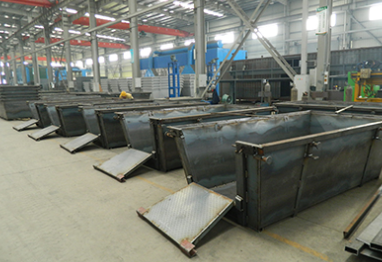Mild steel bins are a popular choice for Waste Management due to their durability and affordability. They are widely used in various industries, commercial buildings, and even residential areas for collecting and storing different types of waste materials. However, whether they are the best choice for waste management depends on several factors that need to be considered. In this essay, we will discuss the advantages and disadvantages of mild steel bins and explore other possible alternatives.
Mild steel is a type of carbon steel with low carbon content and is often used in manufacturing due to its malleability, strength, and low cost. Mild steel bins are available in various sizes, shapes, and designs, making them versatile for different waste management needs. They can be easily custom-made and fabricated to fit specific requirements and can withstand harsh weather conditions, making them suitable for both indoor and outdoor use.
One of the main advantages of mild steel bins is their durability. They have a long lifespan and can resist corrosion, which is crucial for waste management where exposure to moisture and chemicals is common. Mild steel bins are also resistant to fire, which is an important safety feature in waste management, especially when dealing with flammable waste materials. Moreover, mild steel bins can withstand heavy loads and are not easily damaged, ensuring that they can endure the rigors of waste collection and transportation.

Affordability is another significant advantage of mild steel bins. Mild steel is less expensive compared to other materials commonly used for waste management, such as stainless steel. This cost-effectiveness makes mild steel bins an attractive choice, especially for organizations or municipalities with budget constraints. Their availability and relatively low production costs also make mild steel bins accessible for small businesses and residential areas that require waste management solutions.
However, there are some disadvantages to consider when using mild steel bins for waste management. One concern is the potential for rusting or corrosion over time. Though mild steel is resistant to corrosion compared to other steels, it is not entirely immune. Exposure to moisture, chemicals, and harsh environmental conditions can cause rusting and deterioration, compromising the integrity of the bins. Regular maintenance and protective coatings can help mitigate this issue, but it adds an additional cost and effort.
Another disadvantage of mild steel bins is their weight. Mild steel is denser compared to other materials like plastic, which makes the bins heavier. This weight can make transportation and handling more challenging, especially for large or full bins. Additionally, the weight of mild steel bins may require more substantial support structures and foundations, increasing the overall cost of waste management infrastructure.
Furthermore, mild steel bins are not suitable for waste materials that are highly reactive or corrosive. Substances like acids and alkalis can damage the mild steel surface and cause leaks or contamination. In such cases, alternative materials like stainless steel or specialized Containers may be more appropriate.
Considering these advantages and disadvantages, mild steel bins can be a good choice for waste management in certain situations. They are durable, fire-resistant, and cost-effective, making them ideal for general waste collection and storage. However, their susceptibility to rusting, weight, and incompatibility with corrosive substances should be taken into account when selecting waste management solutions.
Alternative materials to consider for waste management include plastic, stainless steel, and specialized containers. Plastic bins are lightweight, resistant to corrosion, and do not require additional maintenance against rusting. Stainless steel bins offer excellent corrosion resistance and are more suitable for specific waste streams, such as medical or hazardous waste. Specialized containers, like those made of fiberglass or polyethylene, are designed for more specific needs, such as chemical or liquid waste.
In conclusion, mild steel bins provide a durable and affordable solution for waste management. Their durability, resistance to fire, and ability to withstand heavy loads make them suitable for various applications. However, their susceptibility to rusting, weight, and limited compatibility with corrosive substances should be carefully considered. Depending on specific requirements, alternative materials like plastic, stainless steel, or specialized containers may be more suitable for waste management. Ultimately, the choice of bins should be based on a careful evaluation of the waste types, budget constraints, and the overall waste management infrastructure.




Commento
(0)